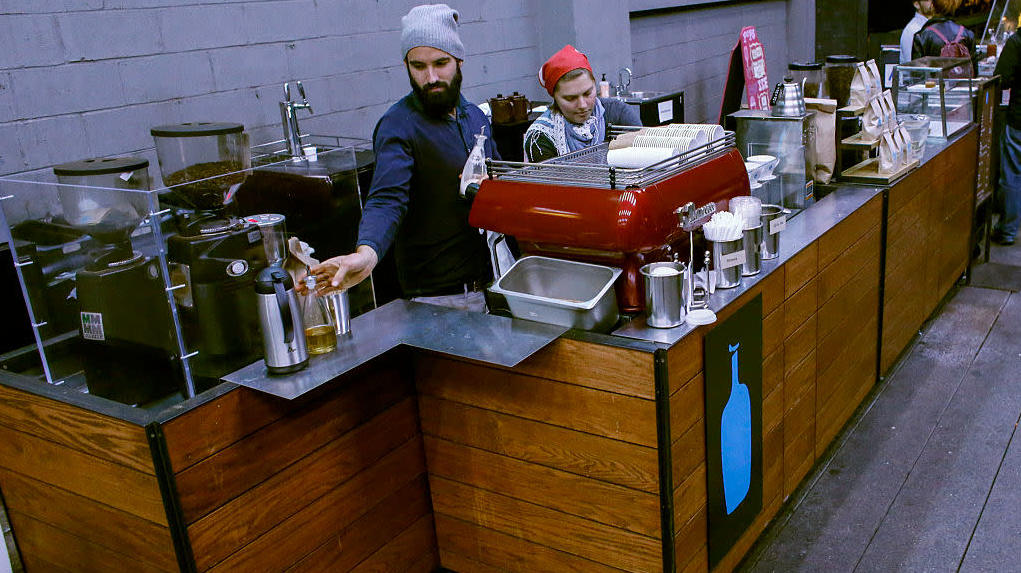Blue Bottle Coffee Starts Its Plan To Go Zero-Waste By Cancelling Disposable Cups
If you've ever had the dubious pleasure of trash duty at a coffee shop, you know that coffee-drinkers are responsible for an awful lot of waste: cups, straws, stirrers, sugar packets, napkins. Some companies have been trying to do their part by using cardboard straws, metal stirrers, and bioplastic cups, and by composting coffee grounds. In January, a new city ordinance in Berkeley (of course) will add a 25-cent surcharge on paper cups. Blue Bottle Coffee has promised to do them all one better by eliminating 90% of its waste by the end of 2021.
The Oakland-based coffee roaster—which has nearly 70 locations in the U.S.—will begin piloting its zero-waste program, based on standards established by the Zero Waste International Alliance, in two Bay Area cafes in early 2020 by eliminating disposable cups and coffee bags altogether. Instead, the San Francisco Chronicle reports, it will require customers to either bring their own cups or pay a $3-$5 deposit on cups they can borrow and return later. (Let's hope these containers don't explode like Blue Bottle's coffee bean cans earlier this year.) The same policies will apply to bulk coffee beans and yogurt. CEO Bryan Meehan says it "will celebrate reuse as an act of aesthetic delight."
Although menu prices will remain the same, Meehan says he anticipates that the pilot locations will bring in less money, at least at first. He assumes that customers will walk off with cups, which will cost the company far more than the deposit fee, and that others will stay away altogether because they think it's too much fuss.
The disabled community is also not entirely pleased; paper cups may become just as controversial as plastic straws. Disability advocates have pointed out that some people have trouble carrying and drinking from reusable cups. Even if coffee shops do keep disposable paper cups on hand, it may lead to some awkward conversations. "You don't want a customer to have to say, 'Hi, I'm disabled, give me a free cup,'" Sophie Hahn, a Berkeley city councilwoman, told the Chronicle. "By the same token, you don't want a worker to have to say, 'Well, what kind of disability do you have and how do you prove it?'"
Meehan, though, is determined to move forward. This change goes along with a pledge made by Nestlé, which became a 68% shareholder of Blue Bottle in 2017, to make all its packaging recyclable by 2025 and become entirely carbon-neutral by 2050. (A post by SF Eater points out that Nestlé has faced allegations of child slavery in its cocoa farms in Ivory Coast and buys its palm oil from FGV Holdings Berhad, a Malaysian company that has been accused of using forced labor on its plantations.) "There's a lot of fear that guests are so used to this behavior pattern that they're going to get really annoyed with us," Meehan said of critics. "We've got to face the pain and the fear and get on with it."
